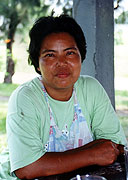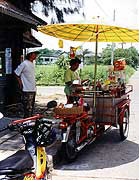Talking to a Food Vendor
Boonfak Suajamsin sits in front of my house almost every day. We have been waving hello and goodbye to each other for two years. She is very friendly and I am certain she keeps an eye on my house when I am not around. I can see her from my upstairs window right now. Boonfak sells her snacks and drinks come rain or shine. I decided to head across the street and talk to her about her life and business.
She is the mother of two daughters and has been married for 17 years. She comes from Patum Thani but has been living in Bangkok for 19 years. She works six days a week from 6 am until 4 pm. She takes in about 600 baht (13.33 US Dollars) a day, 380 baht (8.44 US Dollars) of which is profit. This means she makes 9,880 baht per month (219.55 US Dollars). She has been doing this for eight years.
She sells coffee (18-22 cents), cigarettes (1 US Dollar), tea (18-22 cents), water (11 cents), soft drinks (20 cents), matches (0.5 cents), peanuts (22 cents), doughnuts (13 cents) and lighters (18 cents). She purchased her vending cart and motorcycle for 25,000 baht (555 US Dollars). She points to it saying, “I don’t have a car. That is my car.”
lighters (18 cents). She purchased her vending cart and motorcycle for 25,000 baht (555 US Dollars). She points to it saying, “I don’t have a car. That is my car.”
Her family lives in a small two-bedroom house. They purchased their house for 600,000 baht (13,333 US dollars) and are paying a mortgage of 8,200 baht (182 US Dollars) a month. The family spends 6,000 baht (133 US Dollars) per month on food, 1,200 baht (26 US Dollars) per month on electricity, and each daughter needs about 400 baht (8.80 US Dollars) a week for clothes, school supplies, snacks, and transportation.
As I sat talking to Boonfak, her family arrived on the family’s 43,000 baht (955 US Dollars) Honda 110-cc motorbike. Her husband, an exhausted and grumpy looking fellow, seemed flustered by my presence. He is 40 years old and works as an electrician. He can make up to 15,000 baht (333 US Dollars) a month but must wait for his company to call him for a job. The family did not seem happy to have him around and, well, he was not at work on Monday at 2:30 pm.
around and, well, he was not at work on Monday at 2:30 pm.
Her oldest daughter (16) was armed with a basic English grammar book. She is currently attending high school and wants to be an airline stewardess or a tour guide after she finishes university. She was happy to practice speaking English with me and wants to be fluent someday. I flipped through her English book. The exercises were at an upper-intermediate level, but her spoken English was not as good.
She told me, “At school I have a Thai teacher for English class. We learn things like ‘break, broke, broken’. I know grammar, but I cannot speak English. I do not understand idioms.”
The younger daughter (13) was carrying bags of school supplies and clothes for the new school year. She could speak very little English and seemed more interested in trying on her new clothes and consuming soft drinks than anything else.
When I asked the family what they like to do for fun, I received the following answers: Boonfak: “I like to make money and sell things. I like my job.” Older daughter: “I like to read.” Younger daughter: “Eating.” Father: “Jogging in the morning.” At this statement the oldest daughter yelled out: “My father likes to drink whiskey!” Shortly thereafter he drove off.
Boonfak: “I like to make money and sell things. I like my job.” Older daughter: “I like to read.” Younger daughter: “Eating.” Father: “Jogging in the morning.” At this statement the oldest daughter yelled out: “My father likes to drink whiskey!” Shortly thereafter he drove off.
Boonfak and her husband are doing quite well for themselves considering the level of education they both have received. She attended school from age 7-9 and cannot read or write. She seemed embarrassed by this, especially when her daughters started laughing about it. Her husband went to school from age 7-11 and says that he can read and write. The parents plan for both of their daughters to go to university after they finish high school.
Boonfak is a friendly and open woman. She states, “I like foreigners. I wish I could talk to you more but I cannot speak English. I see you everyday. When are you going back to America?” I told her that I did not know, but I enjoy living in Thailand.
Boonfak has good business sense. Whenever possible, she pays cash for purchases rather than buying on credit. The vending cart and family motorcycle were both cash purchases. Selling doughnuts is also a new idea. I believe that if given the chance, Boonfak’s business will expand over time. If everything goes well and her husband works full-time, she can save about 4,000 baht (88.80 US Dollars) each month in my estimate.
She has found herself a good corner to sell on and I do not see her giving up this spot in the future. Boonfak has no plans to change her job. If she could change anything, I believe she would change her husband.
